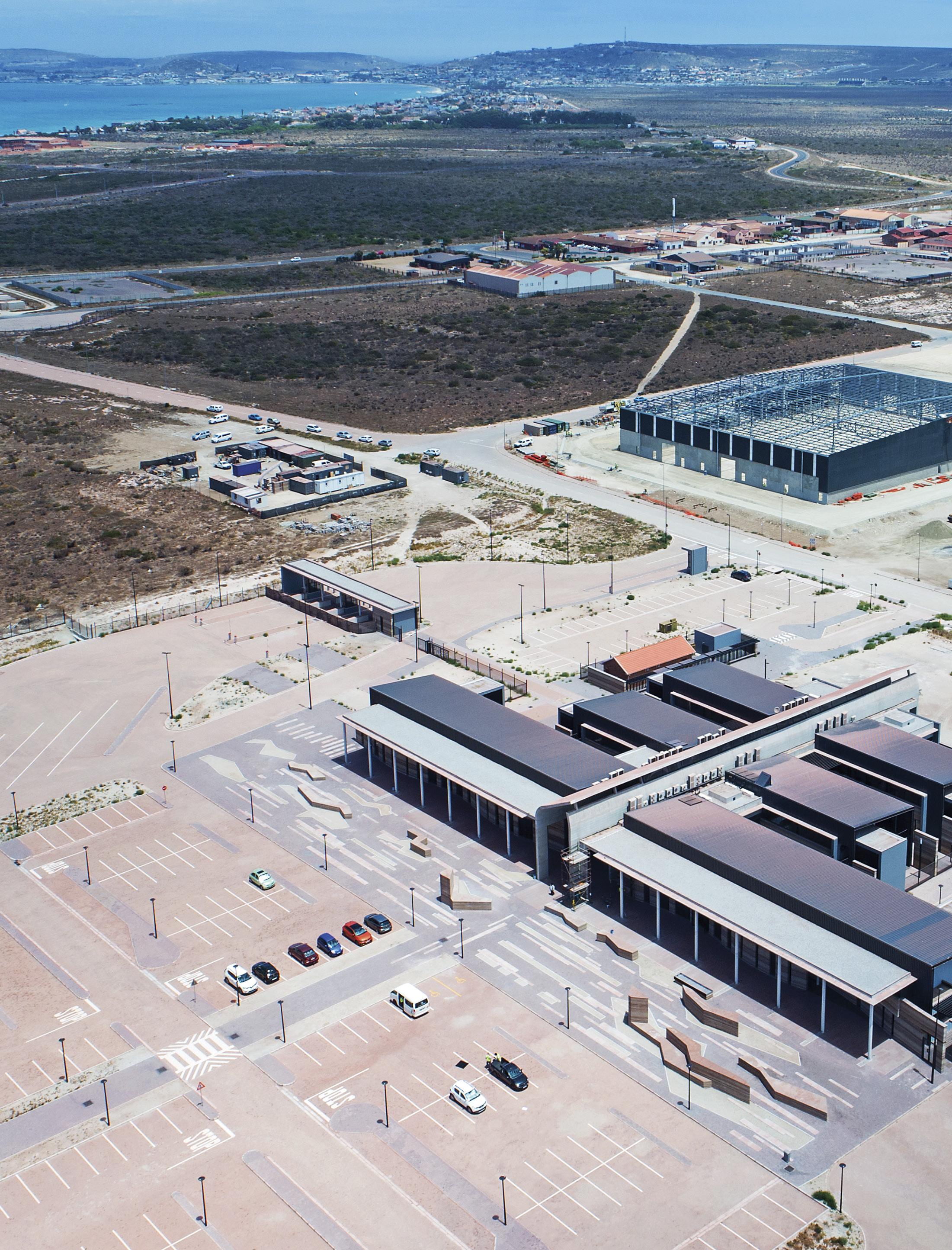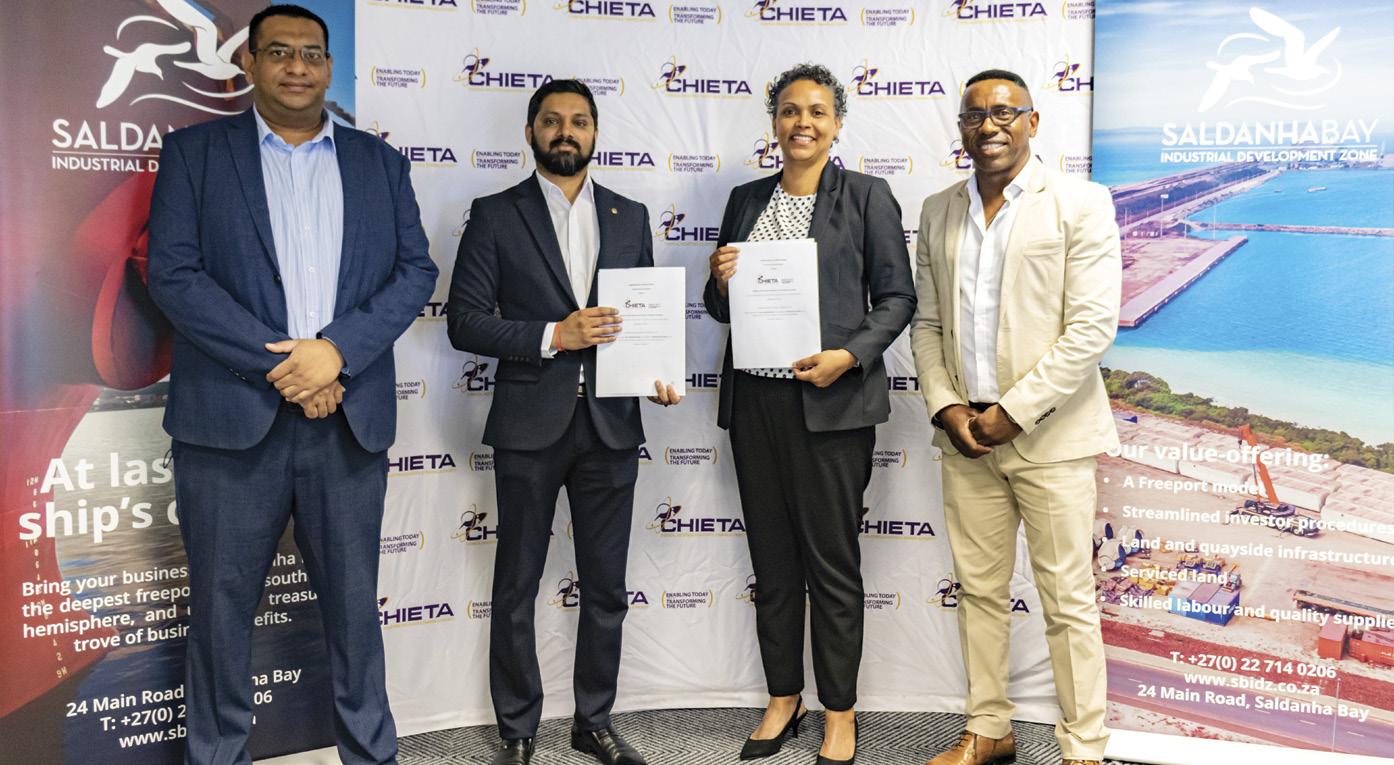
6 minute read
Saldanha Bay Industrial Development Zone
CREATING AN INCLUSIVE,
SUSTAINABLE AND GROWING FUTURE
Advertisement
From its inception in 2013, the objective of the Saldanha Bay Industrial Development Zone Licencing Company SOC Ltd (SBIDZ-LC) was to promote sustainable national economic growth by attracting foreign and domestic investment and technology within the greater Saldanha Bay area. Our vision is to be Africa’s premier maritime, energy, and logistics Freeport, offering a world-class integrated shipyard, engineering, fabrication, logistics, services Freeport environment to zone users and tenants.
To achieve this, the SBIDZ-LC would need to be commercially viable, offering accessible infrastructure and facilities to open markets and create a conducive and collaborative business environment. And importantly, it would have to engage and support the local communities and businesses to enable them to reap the benefits of this environment.
SBIDZ-LC CEO Ms Kaashifah Beukes said, "Our mission to foster responsible investment into the Freeport starts with empowering people and businesses, creating sustainable prosperity, and developing a profitable business environment open for all. To overcome the historical and persistent social and economic underdevelopment of our economy, we have to develop the Freeport in a way that is accessible to the local workforce, businesses small and big near and far and the global markets. We do this together with our longstanding public sector partnerships, such as, with the Saldanha Bay Municipality (SBM), the Transnet National Port Authority (TNPA), the Department of Trade, Industry and Competition (the DTIC), the Western Cape Government, and the SETAs, to mention a few."
these industries." He added that the partnership between the SBM and SBIDZ is vital and is a priority in its Economic Recovery Plan.
these industries." He added that the partnership between the SBM and SBIDZ is vital and is a priority in its Economic Recovery Plan.
Beukes added that the other critical “stakeholder group” are the decisionmakers within the maritime, energy, logistics and related engineering and services sectors. Before anything else, these leaders are primarily concerned with the sustainable growth of their businesses' income and profitability universes in a ramping up of regional competitiveness and climate change.
Therefore, the SBIDZ business purpose must be to offer an optimally managed, skilfully facilitated, worldclass business destination that enables the Freeport and the Port of Saldanha to take its place alongside other, more established maritime and energy ports across the world. It will achieve this by providing an operating environment for clients that emphasises the ease of doing business and the convenience of on-site access to private and government business support services, competitive facilities and infrastructure.
Addressing the increasing awareness and impacts of climate change, another important initiative is the start-up of the Saldanha Bay Innovation Campus. The world is changing and the development of technology, through research and tested applications, will be the cornerstone of a relevant “just transition” to lower carbon-intensive manufacturing and shipping activities. The Saldanha Bay Innovation Campus aims to facilitate such collaboration between business, academia, community and government which will intentionally advance the daily use of innovation and produce novel technologies and research for the marine and energy sectors. In doing so, Saldanha will become a leading catalyst for creating solutions to the most pressing challenges and enhance the global, sustainable competitiveness of industries within the region.
A recent example of this was the DroneTech Innovation Challenge to showcase innovative applications of drone technologies across industries. After a round of submissions, ten businesses were selected to participate in the final pitching event. The Freeport has also proactively engaged schools, through its High Schools' Development Programme, which seeks to galvanise and harness the intellectual capacities and imaginations of the young people and teachers of Saldanha Bay. Teachers within nine public schools recently completed a mathematics digital teaching and learning initiative in collaboration with the Universities of Stellenbosch and the Witwatersrand.
Alongside this, the SBIDZ has engaged in several community-directed skills training and development initiatives to enable new economic and social possibilities for the majority
SBIDZ Executive Development Programmes Patrick Lakabane describes his work as "building local capabilities to maximise local beneficiation". The programme aims to enable and empower through a collaborative approach to upskilling with citizens and the effective use of local businesses within the development of the SBIDZ, in support of its economic development strategy. The Smart Skills Centre will be one such programme to lay the foundation for 4IR relevant skills and training development with key partners from CHIETA and many more. The Smart Skills Centre will offer demand-led digital literacy and fluency skills solutions in the areas of robotics, internet of things, 3D printing, augmented and virtual reality and artificial intelligence through blended learning for the maritime and energy sectors. The Freeport has undertaken many skills development programmes over the last seven years, and recently celebrated the training of over one hundred candidates on programmes supported by Merseta, Chieta, and the LGseta.
Local enterprise development initiatives are advanced through our enterprise and contractor development strategies which are strengthened by the SME Co Lab Centre, which offers free shared office space to local SMEs, and the inclusive local Project Management Team approach which facilitated local contractor procurement of over 95% of our target contraction work packages since 2017.
A big milestone last year was the completion of the pre-feasibility study of a potential R3.5 billion new port infrastructure project for the marine transport and manufacturing sector. Ultimately, in conjunction with the TNPA, it would enable us to offer a greater variety of services and a diversity of docking facilities. Beukes pointed out that their approach to catalysing investment towards these projects is to conceptualise them as a long-term partnership between government, its institutions, and the private sector.
Globally, the big milestone last year was the 2021 United Nations Climate Change Conference – referred to as COP26 – where it was acknowledged that climate change is a real threat to our survival. It also recognised that the actual implementation of net-zero emissions remains a conflicted and complicated process. One significant development that emerged from COP26 was that France, Germany, the United Kingdom and the United States pledged R130 billion to South Africa to speed up the country's decarbonisation efforts. Public Enterprises Minister Pravin Gordhan said that the R130 billion was linked to three government projects: Eskom's just energy transition, green hydrogen and locally produced electric vehicles (EV).
“The reliance on and use of fossil fuels will continue for many years,” said Beukes. “But we need to start planning now for a world that will embrace decarbonisation and an industry – maritime, energy, logistics and related engineering and services sectors – that will depend on and invest in those who have the foresight to adapt, grow and build a sustainable economy that is resilient and inclusive.”
SBIDZ is striving to achieve a future that delivers growth, sustainability, and inclusion. Our promise to the people and businesses of Saldanha Bay is the opportunity to encounter new possibilities for employment, acquire new skills, and engage meaningfully with new economic and human development possibilities. It provides tangible evidence of how, through collaboration, cooperation and partnerships, the government, business and civic society can transform the social and economic landscape of South Africa.

Signing of the MOU between CHIETA and SBIDZ L-R: Mr Ashvir Isseri, Executive Grants & Strategic Projects; Mr Yershen Pillay, CHIETA CEO; Ms. Kaashifah Beukes, CEO of the SBIDZ; and Mr Patrick Lakabane, Executive: Development Programmes, SBIDZ










